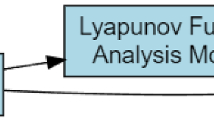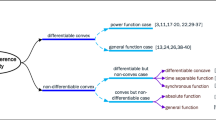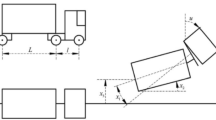Abstract
This paper investigates the fuzzy normalization and stabilization issues of a class of singular fractional order nonlinear systems with order 0 < α < 1 based on a singular Takagi-Sugeno fuzzy model. First, we present the admissibility theorem of Takagi-Sugeno fuzzy singular fractional order systems. Next, benefited by that the fuzzy model and the state feedback controllers do not share the same membership functions, a proportional plus derivative state feedback controller is designed, which guarantees the closed-loop system normalized and admissible. Finally, a numerical simulation example is given to illustrate the effectiveness of the proposed method.
Similar content being viewed by others
References
I. Podlubny, Fractional Differential Equations, Academie Press, New York, 1999.
I. N. Doyea, M. Darouachb, M. Zasadzinski, and N. E. Radhy, “Robust stabilization of uncertain descriptor fractional-order systems,” Automatica, vol. 49, pp. 1907–1913, 2013.
Y. Li, Y. Q. Chen, and I. Podlubny, “Mittag-Leffler stability of fractional order nonlinear dynamic systems,” Automatica, vol. 45, pp. 1965–1969, 2009.
D. Matignon, “Stabilty properties for generalized fractional differential systems,” ESAIM: Proceedings, vol. 5, pp. 145–158, 1998.
J. Sabatier, M. Moze, and C. Farges, “LMI stability conditions for fractional order systems,” Computers & Mathematics with Applications, vol. 59, pp. 1594–1609, 2010.
J. G. Lu and Y. Q. Chen, “Robust stability and stabilization of fractional-order interval systems with the fractional order a: The 0 < α < 1 case,” IEEE Transactions on Automatic Control, vol. 55, no. 1, pp. 152–158, 2010.
J. G. Lu and G. R. Chen, “Robust stability and stabilization of fractional-order interval systems: An LMI approach,” IEEE Transactions on Automatic Control, vol. 54, no. 6, pp. 1294–1299, 2009.
X. F. Zhang and Y. Q. Chen, “D-stability based LMI criteria of stability and stabilization for fractional order systems,” Proc. of the ASME 2015 Int. Design Engineering Technical Conf. & Computers and Information in Engineering Conf., pp. 1–6, 2015.
X. F. Zhang and Y. Q. Chen, “Admissibility and robust stabilization of continuous linear singular fractional order systems with the fractional order α: The 0 < α < 1 case,” ISA Transactions, vol. 82, pp. 42–50, 2017.
Y. H. Wei, J. C. Wang, T. Y. Liu, and Y. Wang, “Sufficient and necessary conditions for stabilizing singular fractional order systems with partially measurable state,” Journal of the Franklin Institute, vol. 356, pp. 1975–1990, 2019.
Y. H. Wei, P. W. Tse, Z. Yao, and Y. Wang, “The output feedback control synthesis for a class of singular fractional order systems,” ISA Transactions, vol. 69, pp. 1–9, 2017.
J. X. Zhang and G. H. Yang, “Low-complexity tracking control of strict-feedback systems with unknown control directions,” IEEE Transactions on Automatic Control, vol. 64, no. 12, pp. 5175–5182, 2019.
P, Cheng, S, He, J. Cheng, X. Luan, and F. Liu, “Asynchronous output feedback control for a class of conic-type nonlinear hidden Markov jump systems within a finite-time interval,” IEEE Transactions on Systems, Man, and Cybernetics: Systems, 2020. DOI: https://doi.org/10.1109/TSMC.2020.2980312
J. X. Zhang and G. H. Yang, “Prescribed performance fault-tolerant control of uncertain nonlinear systems with unknown control directions,” IEEE Transactions on Automatic Control, vol. 62, no. 12, pp. 6529–6535, 2017.
J. X. Zhang and G. H. Yang, “Fault-tolerant output-constrained control of unknown Euler-Lagrange systems with prescribed tracking accuracy,” Automatica, vol. 111, pp. 108606, 2020.
S. He, W. Lyu, and F. Liu, “Robust H∞ sliding mode controller design of a class of time-delayed discrete conic-type nonlinear systems,” IEEE Transactions on Systems, Man, and Cybernetics: Systems, vol. 51, no. 2, pp. 885–892, 2021.
S. Dong, H. Su, P. Shi, R. Lu, and Z. G. Wu, “Filtering for discrete-time switched fuzzy systems with quantization,” IEEE Transactions on Fuzzy Systems, vol. 25, no. 6, pp. 1616–1628, 2017.
Y. Zhu and W. X. Zheng, “Multiple Lyapunov functions analysis approach for discrete-time-switched piecewise-affine systems under dwell-time constraints,” IEEE Transactions on Automatic Control, vol. 65, no. 5, pp. 2177–2184, 2020.
Y. Zhu, W. X. Zheng, and D. Zhou, “Quasi-synchronization of discrete-time Lur’e-type switched systems with parameter mismatches and relaxed PDT constraints,” IEEE Transactions on Cybernetics, vol. 50, no. 5, pp. 2026–2037, 2020.
S. Dong, M. Fang, P. Shi, Z. G. Wu, and D. Zhang, “Dissipativity-based control for fuzzy systems with asynchronous modes and intermittent measurements,” IEEE Transactions on Cybernetics, vol. 50, no. 6, pp. 2389–2399, 2020.
S. Dong, Z. G. Wu, P. Shi, H. Su, and T. Huang, “Quantized control of Markov jump nonlinear systems based on fuzzy hidden Markov model,” IEEE Transactions on Cybernetics, vol. 49, no. 7, pp. 2420–2430, 2019.
H. K. Lam and M. Narimani, “Stability analysis and performance design for fuzzy-model-based control system under imperfect premise matching,” IEEE Transactions on Fuzzy Systems, vol. 17, no. 4, pp. 949–961, 2009.
T. Takagi and M. Sugeno, “Fuzzy identification of systems and its application to modeling and control,” IEEE Trans. Syst. Man Cybern., vol. 15, no. 1, pp. 116–132, 1985.
C. Ren, S. He, X. Luan, F. Liu, and H. R. Karimi, “Finite-time L2-gain asynchronous control for continuous-time positive hidden Markov jump systems via T-S fuzzy model approach,” IEEE Transactions on Cybernetics, vol. 51, no. 1, pp. 77–87, 2021.
Z. G. Feng and P. Shi, “Admissibilization of singular interval-valued fuzzy systems,” IEEE Transactions on Fuzzy Systems, vol. 25, no. 6, pp. 1765–1776, 2017.
H. K. Lam, H. Y. Li, C. Deters, E. L. Secco, H. A. Wurdemann, and K. Althoefer, “Control design for interval type-2 fuzzy systems under imperfect premise matching,” IEEE Transactions on Fuzzy Systems, vol. 61, no. 2, pp. 956–968, 2014.
H. Y. Li, X. J. Sun, L. G. Wu, and H. K. Lam, “State and output feedback control of interval type-2 fuzzy systems with mismatched membership functions,” IEEE Transactions on Fuzzy Systems, vol. 23, no. 6, pp. 1943–1957, 2015.
T. Taniguchi, K. Tanaka, K. Yamafuji, and H. O. Wang, “Fuzzy descriptor systems: Stability analysis and design via LMIs,” Proc. of the American Control Conference, pp. 1827–1831, 1999.
T. Taniguchi, K. Tanaka, and H.O. Wang, “Fuzzy descriptor systems and nonlinear model following control,” IEEE Transactions on Fuzzy Systems, vol. 8, no. 4, pp. 442–452, 2000.
K. Tanaka and H. O. Wang, Fuzzy Control Systems Design and Analysis: A Linear Matrix Inequality Approach, Wiley, New York, 2001.
T. Bouarar, K. Guelton, and N. Manamanni, “Robust fuzzy Lyapunov stabilization for uncertain and disturbed Takagi-Sugeno descriptors,” ISA Transactions, vol. 49, pp. 447–461, 2010.
Y. D. Ji, L. Su, and J. Qiu, “Design of fuzzy output feedback stabilization for uncertain fractional-order systems,” Neurocomputing, vol. 173, pp. 1283–1693, 2016.
R. C. Li and X. F. Zhang, “Adaptive sliding mode observer design for a class of T-S fuzzy descriptor fractional order systems,” IEEE Transactions on Fuzzy Systems, vol. 28, no. 9, pp. 1951–1960, 2020.
X. F. Zhang and Z. L. Zhao, “Normalization and stabilization for rectangular singular fractional order T-S fuzzy systems,” Fuzzy Sets and Systems, vol. 381, pp. 140–153, 2020.
T. Kaczorek and K. Rogowski, Fractional Linear Systems and Electrical Circuits, Springer International Publishing, Switzerland, 2015.
Author information
Authors and Affiliations
Corresponding author
Additional information
Recommended by Editor Euntai Kim.
Xuefeng Zhang received his B.Sc. degree in applied mathematics, an M.S. degree in control theory and control engineering, and a Ph.D. degree in control theory and control engineering from Northeastern University, Shenyang, China, in 1989, 2004, and 2008, respectively, where he is currently with the college of Sciences. He has published more than 100 journal and conference papers and 3 books. He is the Associate Editor of IEEE Access and the Committee member of Technical Committee on Fractional and Control of Chinese Association of Automation. His research interests include fractional order control systems and singular systems.
Kai**g ** received her B.Sc. degree in information and computing science from Bohai University in 2018. She is currently pursuing an M.S. degree in operations research and cybernetics with Northeastern University, Shenyang, China, where she is also with the School of Sciences. Her research interests include fractional order systems, Takagi-Sugeno fuzzy systems and singular systems.
Publisher’s Note
Springer Nature remains neutral with regard to jurisdictional claims in published maps and institutional affiliations.
Rights and permissions
About this article
Cite this article
Zhang, X., **, K. Proportional Plus Derivative State Feedback Control of Takagi-Sugeno Fuzzy Singular Fractional Order Systems. Int. J. Control Autom. Syst. 19, 3823–3829 (2021). https://doi.org/10.1007/s12555-020-0556-9
Received:
Revised:
Accepted:
Published:
Issue Date:
DOI: https://doi.org/10.1007/s12555-020-0556-9




